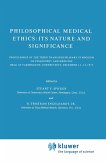Medical Research Ethics: Challenges in the 21st Century
Herausgegeben:Zima, Tomas; Weisstub, David N.
Medical Research Ethics: Challenges in the 21st Century
Herausgegeben:Zima, Tomas; Weisstub, David N.
- Broschiertes Buch
- Merkliste
- Auf die Merkliste
- Bewerten Bewerten
- Teilen
- Produkt teilen
- Produkterinnerung
- Produkterinnerung
This book provides a current review of Medical Research Ethics on a global basis. The book contains chapters that are historically and philosophically reflective and aimed to promote a discussion about controversial and foundational aspects in the field. An elaborate group of chapters concentrates on key areas of medical research where there are core ethical issues that arise both in theory and practice: genetics, neuroscience, surgery, palliative care, diagnostics, risk and prediction, security, pandemic threats, finances, technology, and public policy.This book is suitable for use from the…mehr
Andere Kunden interessierten sich auch für
![Medical Research Ethics: Challenges in the 21st Century Medical Research Ethics: Challenges in the 21st Century]() Medical Research Ethics: Challenges in the 21st Century97,99 €
Medical Research Ethics: Challenges in the 21st Century97,99 €![Too Conscientious: The Evolution of Ethical Challenges to Professionalism in the American Medical Marketplace Too Conscientious: The Evolution of Ethical Challenges to Professionalism in the American Medical Marketplace]() Douglas E. LemleyToo Conscientious: The Evolution of Ethical Challenges to Professionalism in the American Medical Marketplace90,99 €
Douglas E. LemleyToo Conscientious: The Evolution of Ethical Challenges to Professionalism in the American Medical Marketplace90,99 €![Too Conscientious: The Evolution of Ethical Challenges to Professionalism in the American Medical Marketplace Too Conscientious: The Evolution of Ethical Challenges to Professionalism in the American Medical Marketplace]() Douglas E. LemleyToo Conscientious: The Evolution of Ethical Challenges to Professionalism in the American Medical Marketplace128,39 €
Douglas E. LemleyToo Conscientious: The Evolution of Ethical Challenges to Professionalism in the American Medical Marketplace128,39 €![Medical Ethics: Evolution, Rights and the Physician Medical Ethics: Evolution, Rights and the Physician]() H. A. ShenkinMedical Ethics: Evolution, Rights and the Physician41,99 €
H. A. ShenkinMedical Ethics: Evolution, Rights and the Physician41,99 €![Global Bioethics: The Impact of the UNESCO International Bioethics Committee Global Bioethics: The Impact of the UNESCO International Bioethics Committee]() Global Bioethics: The Impact of the UNESCO International Bioethics Committee38,99 €
Global Bioethics: The Impact of the UNESCO International Bioethics Committee38,99 €![The Ethics of Citizenship in the 21st Century The Ethics of Citizenship in the 21st Century]() The Ethics of Citizenship in the 21st Century67,99 €
The Ethics of Citizenship in the 21st Century67,99 €![Philosophical Medical Ethics: Its Nature and Significance Philosophical Medical Ethics: Its Nature and Significance]() Philosophical Medical Ethics: Its Nature and Significance121,99 €
Philosophical Medical Ethics: Its Nature and Significance121,99 €-
-
-
This book provides a current review of Medical Research Ethics on a global basis. The book contains chapters that are historically and philosophically reflective and aimed to promote a discussion about controversial and foundational aspects in the field. An elaborate group of chapters concentrates on key areas of medical research where there are core ethical issues that arise both in theory and practice: genetics, neuroscience, surgery, palliative care, diagnostics, risk and prediction, security, pandemic threats, finances, technology, and public policy.This book is suitable for use from the most basic introductory courses to the highest levels of expertise in multidisciplinary contexts. The insights and research by this group of top scholars in the field of bioethics is an indispensable read for medical students in bioethics seminars and courses as well as for philosophy of bioethics classes in departments of philosophy, nursing faculties, law schools where bioethics is linked to medical law, experts in comparative law and public health, international human rights, and is equally useful for policy planning in pharmaceutical companies.
Produktdetails
- Produktdetails
- Philosophy and Medicine 132
- Verlag: Springer / Springer International Publishing / Springer, Berlin
- Artikelnr. des Verlages: 978-3-031-12694-9
- 2023
- Seitenzahl: 516
- Erscheinungstermin: 4. Januar 2024
- Englisch
- Abmessung: 235mm x 155mm x 28mm
- Gewicht: 774g
- ISBN-13: 9783031126949
- ISBN-10: 3031126947
- Artikelnr.: 69610996
- Herstellerkennzeichnung Die Herstellerinformationen sind derzeit nicht verfügbar.
- Philosophy and Medicine 132
- Verlag: Springer / Springer International Publishing / Springer, Berlin
- Artikelnr. des Verlages: 978-3-031-12694-9
- 2023
- Seitenzahl: 516
- Erscheinungstermin: 4. Januar 2024
- Englisch
- Abmessung: 235mm x 155mm x 28mm
- Gewicht: 774g
- ISBN-13: 9783031126949
- ISBN-10: 3031126947
- Artikelnr.: 69610996
- Herstellerkennzeichnung Die Herstellerinformationen sind derzeit nicht verfügbar.
Professor Tomas Zima, Head of the Institute of Medical Biochemistry and Laboratory Medicine First Faculty of Medicine Charles University in Prague, served as Dean of the First Faculty of Medicine and Rector Magnificus of Charles University. Professor Zima is author of 470 articles which have been cited over 4500 times in the Science Citation Index. He has also written nine books and is Author of over 75 additional chapters. He has lectured globally at 160 universities and served in many leadership roles including as Member of the European Commission's Scientific Panel for Health (SPH). He is Chair of the Advisory Board for the International Academy of Medical Ethics and Public Health. Professor Weisstub is Honorary Life President of the International Academy of Law and Mental Health and Co-President of the International Academy of Medical Ethics and Public Health. He is Founding Editor of the International Library of Ethics, Law, and the New Medicine (Springer). For over 40years, he was Editor-in-Chief of the International Journal of Law and Psychiatry (Elsevier) and is Co-Editor of Éthique, Médecine et Politiques Publiques with Professor Christian Hervé. For over 20 years, he was Professor of Law at Osgoode Hall Law School and Professor of Psychiatry at the University of Toronto. Until 2017, Professor Weisstub has held the Philippe Pinel Professorship in Legal Psychiatry and Biomedical Ethics at the Université de Montréal. He is Recipient of honorary doctorates in the USA, Canada, Belgium, Austria, Italy and the Czech Republic. A Chevalier of the French Legion of Honour, he was appointed Grande Ufficiale in the Republic of Italy and knighted by the Queen of the Netherlands in the Order of the Dutch Lion.
Part 1: Philosophical Foundations.- Chapter 1. Embryo Research Ethics (Robert George).- Chapter 2. The Ethics of Medical Research (David Novak).- Chapter 3. Genopolitics (Jonathan Moreno).- Part 2: Vulnerability.- Chapter 4. Persons and Groups: Protection of research participants with vulnerabilities as a process (Pawel Lukow).- Chapter 5. Centring the Human Subject: Catalyzing Change in Ethics and Dementia Research (Susan Cox).- Part 3: Genetics.- Chapter 6. Unproven Stem Cell-Based Interventions: Addressing Patients' Unmet Needs or Causing Patient Harms (Kirstin Matthews).- Chapter 7. Genetic Privacy in the Age of Consumer & Forensic DNA Applications (Sheldon Krimsky).- Part 4: Neuroscience.- Chapter 8. Ethical Issues in Neuroscience Research (Walter Glannon).- Chapter 9. Should Prisoners' Participation in Neuroscientific Research Always be Disregarded When Making Decisions About Early Release? (Elizabeth Shaw).- Chapter 10. Applying Neuroscience Research: The bioethical problems ofpredicting and explaining behavior (David Freedman).- Chapter 11. Direct Benefit, Equipoise, And Research On The Non-Consenting (Stephen Napier).- Part 5. Surgery.- Chapter 12. The Ethics of Surgical Research and Innovation (Wendy A Rogers).- Part 6. Palliative Care.- Chapter 13. Opening Death's Door: Psilocybin and Therapeutic Meaning Response in Palliative Care (Duff Waring).- Part 7. Diagnostics, Risk, and Prediction.- Chapter 14. How Risky Can Biomedical Research Be? (Joanna Rozynska).- Chapter 15. Biomedical Ethics and Prediction of Terrorism (David Shapiro).- Chapter 16. PTSD and Biomedical Research: Ethical Conundrums (Lenore Walker).- Part 8. Security and Pandemic Threats.- Chapter 17. Human Rights and Priorities in Medical Research Ethics in Light of the COVID-19 Pandemic (Jonathan Hafetz).- Chapter 18. An Aspirational Code of Conduct for Life Scientists (Malcolm Dando).- Chapter 19. Research Ethics in Exceptional Times: What lessons should we learn from Covid-19? (Søren Holm).- Chapter 20. Ethics of Expanded Access during the COVID-19 Pandemic (Eline Bunnik).- Part 9. Research Ethics Review: Multicontinental Perspectives.- Chapter 21. Bioethics and its Relation to Medical Research in Japan: Historical Influences and Contemporary Pressures (Darryl Macer).- Chapter 22. Ethical Evaluations of Clinical Trials in France: Towards European Standardization (Bettina Couderc).- Chapter 23. Research Ethics and Research Ethics Committees in Europe (Dirk Lanzerath).- Chapter 24. Conflicts of Interest in Biomedical Research in French Law (Guillaume Rousset).- Part 10. Finances, Technology, and Public Policy.- Chapter 25. Structural Problems in the Practice of Psychiatric Research (Heather Stuart).- Chapter 26. The Place of Digital and Artificial Intelligence in Medical Research (Anne-Marie Duguet).- Chapter 27. A framework to govern the use of health data for research in Africa: A South African perspective (Ciara Staunton).
Part 1: Philosophical Foundations.- Chapter 1. Embryo Research Ethics (Robert George).- Chapter 2. The Ethics of Medical Research (David Novak).- Chapter 3. Genopolitics (Jonathan Moreno).- Part 2: Vulnerability.- Chapter 4. Persons and Groups: Protection of research participants with vulnerabilities as a process (Pawel Lukow).- Chapter 5. Centring the Human Subject: Catalyzing Change in Ethics and Dementia Research (Susan Cox).- Part 3: Genetics.- Chapter 6. Unproven Stem Cell-Based Interventions: Addressing Patients' Unmet Needs or Causing Patient Harms (Kirstin Matthews).- Chapter 7. Genetic Privacy in the Age of Consumer & Forensic DNA Applications (Sheldon Krimsky).- Part 4: Neuroscience.- Chapter 8. Ethical Issues in Neuroscience Research (Walter Glannon).- Chapter 9. Should Prisoners' Participation in Neuroscientific Research Always be Disregarded When Making Decisions About Early Release? (Elizabeth Shaw).- Chapter 10. Applying Neuroscience Research: The bioethical problems ofpredicting and explaining behavior (David Freedman).- Chapter 11. Direct Benefit, Equipoise, And Research On The Non-Consenting (Stephen Napier).- Part 5. Surgery.- Chapter 12. The Ethics of Surgical Research and Innovation (Wendy A Rogers).- Part 6. Palliative Care.- Chapter 13. Opening Death's Door: Psilocybin and Therapeutic Meaning Response in Palliative Care (Duff Waring).- Part 7. Diagnostics, Risk, and Prediction.- Chapter 14. How Risky Can Biomedical Research Be? (Joanna Rozynska).- Chapter 15. Biomedical Ethics and Prediction of Terrorism (David Shapiro).- Chapter 16. PTSD and Biomedical Research: Ethical Conundrums (Lenore Walker).- Part 8. Security and Pandemic Threats.- Chapter 17. Human Rights and Priorities in Medical Research Ethics in Light of the COVID-19 Pandemic (Jonathan Hafetz).- Chapter 18. An Aspirational Code of Conduct for Life Scientists (Malcolm Dando).- Chapter 19. Research Ethics in Exceptional Times: What lessons should we learn from Covid-19? (Søren Holm).- Chapter 20. Ethics of Expanded Access during the COVID-19 Pandemic (Eline Bunnik).- Part 9. Research Ethics Review: Multicontinental Perspectives.- Chapter 21. Bioethics and its Relation to Medical Research in Japan: Historical Influences and Contemporary Pressures (Darryl Macer).- Chapter 22. Ethical Evaluations of Clinical Trials in France: Towards European Standardization (Bettina Couderc).- Chapter 23. Research Ethics and Research Ethics Committees in Europe (Dirk Lanzerath).- Chapter 24. Conflicts of Interest in Biomedical Research in French Law (Guillaume Rousset).- Part 10. Finances, Technology, and Public Policy.- Chapter 25. Structural Problems in the Practice of Psychiatric Research (Heather Stuart).- Chapter 26. The Place of Digital and Artificial Intelligence in Medical Research (Anne-Marie Duguet).- Chapter 27. A framework to govern the use of health data for research in Africa: A South African perspective (Ciara Staunton).








